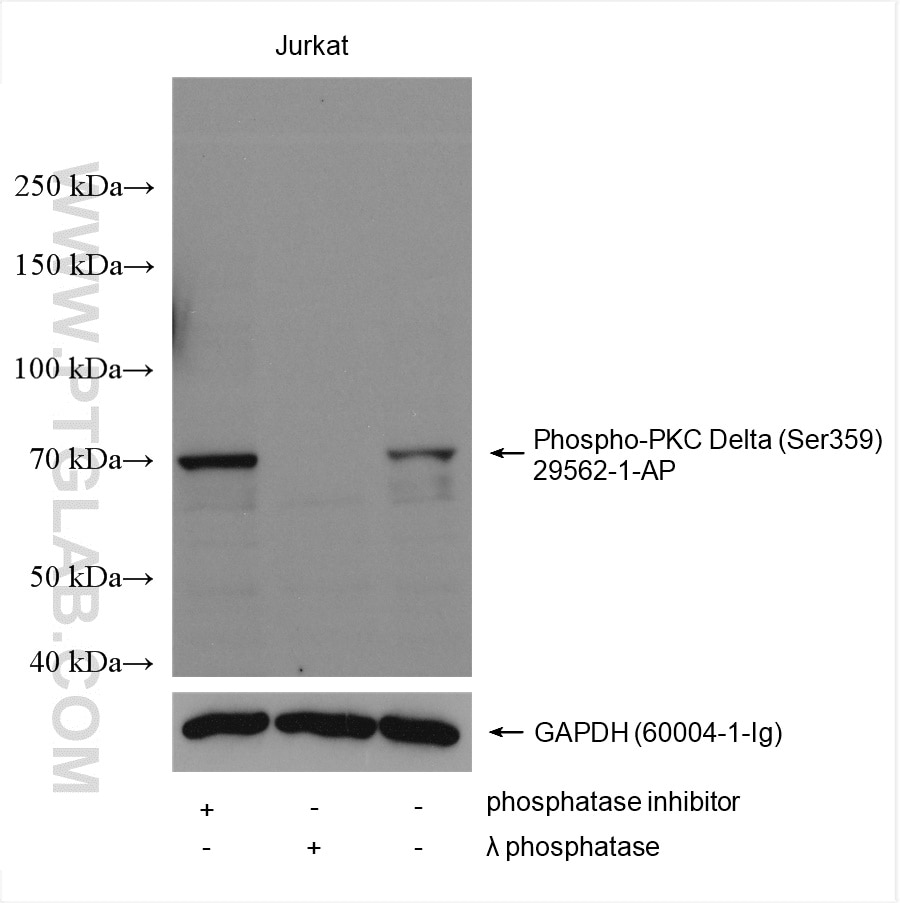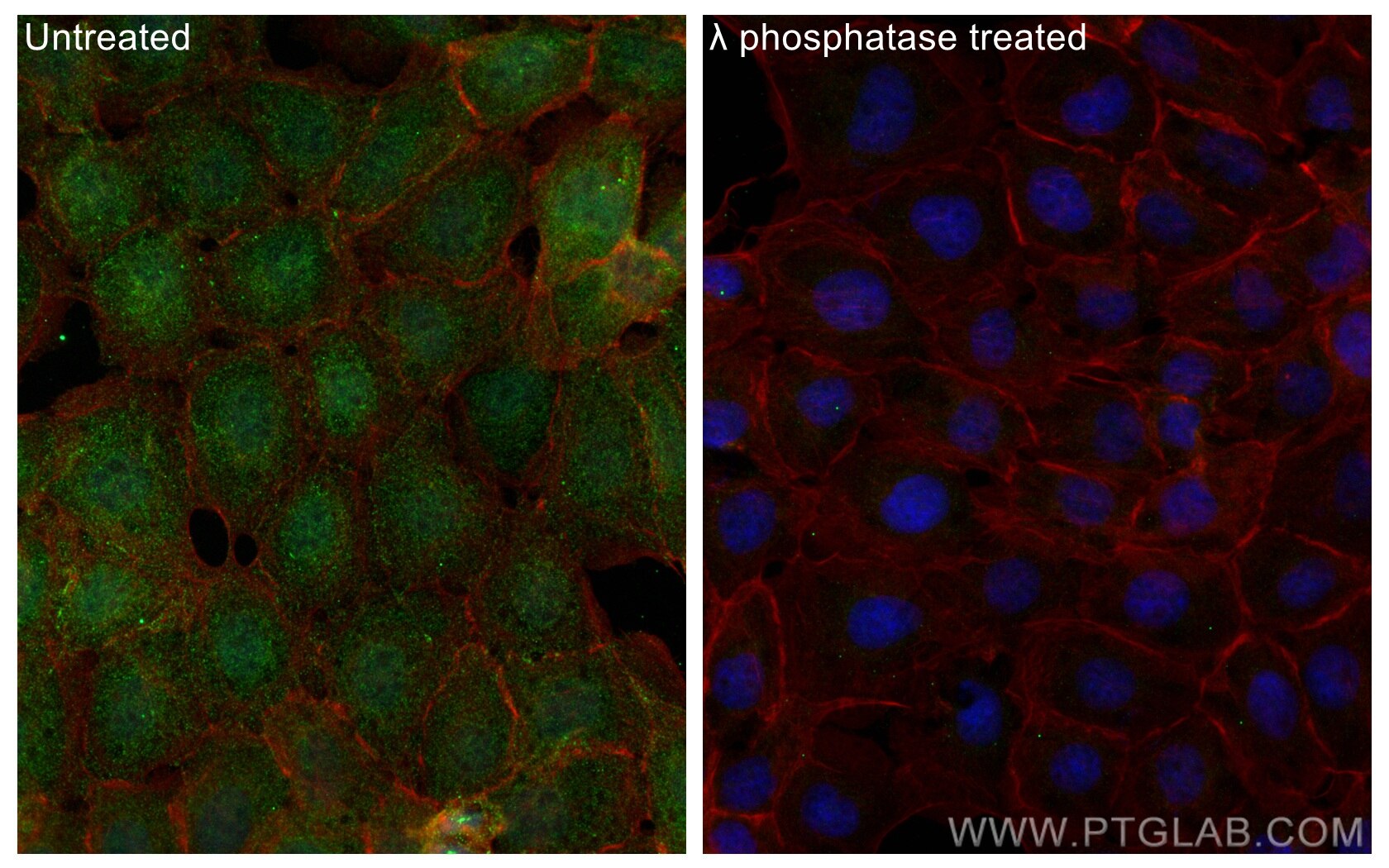Anticorps Polyclonal de lapin anti-Phospho-PKC Delta (Ser359)
Phospho-PKC Delta (Ser359) Polyclonal Antibody for IF, WB, ELISA
Hôte / Isotype
Lapin / IgG
Réactivité testée
Humain et plus (2)
Applications
WB, IF, ELISA
Conjugaison
Non conjugué
N° de cat : 29562-1-AP
Synonymes
Galerie de données de validation
Applications testées
| Résultats positifs en WB | cellules Jurkat traitées à la λ phosphatase, |
| Résultats positifs en IF | λ phosphatase treated A431 cells, |
Dilution recommandée
| Application | Dilution |
|---|---|
| Western Blot (WB) | WB : 1:500-1:1000 |
| Immunofluorescence (IF) | IF : 1:50-1:500 |
| It is recommended that this reagent should be titrated in each testing system to obtain optimal results. | |
| Sample-dependent, check data in validation data gallery | |
Applications publiées
| WB | See 1 publications below |
Informations sur le produit
29562-1-AP cible Phospho-PKC Delta (Ser359) dans les applications de WB, IF, ELISA et montre une réactivité avec des échantillons Humain
| Réactivité | Humain |
| Réactivité citée | rat, souris |
| Hôte / Isotype | Lapin / IgG |
| Clonalité | Polyclonal |
| Type | Anticorps |
| Immunogène | Peptide |
| Nom complet | protein kinase C, delta |
| Masse moléculaire calculée | 78 kDa |
| Poids moléculaire observé | 70 kDa |
| Numéro d’acquisition GenBank | BC043350 |
| Symbole du gène | PRKCD |
| Identification du gène (NCBI) | 5580 |
| Conjugaison | Non conjugué |
| Forme | Liquide |
| Méthode de purification | Purification par affinité contre l'antigène |
| Tampon de stockage | PBS avec azoture de sodium à 0,02 % et glycérol à 50 % pH 7,3 |
| Conditions de stockage | Stocker à -20°C. Stable pendant un an après l'expédition. L'aliquotage n'est pas nécessaire pour le stockage à -20oC Les 20ul contiennent 0,1% de BSA. |
Informations générales
Protein kinase C (PKC) was initially identified and characterized as a protein hydrolysis-activated kinase called protein kinase M. It has been established that PKC is a family of at least 12 serine/threonine kinases that is divided into three subfamilies: The classical PKCs (α, β1, β2, and γ), which are activated by diacylglycerol (DAG) and calcium; the novel PKCs (δ, ε, η, and θ) which are activated by DAG; and the atypical PKCs (ζ and λ/ι), which respond to neither DAG nor calcium. PKCδ, unlike other members of the PKC family, is unique in its regulation by tyrosine phosphorylation on multiple sites that determine activation, localization, and substrate specificity. PKCδ is activated by inflammatory mediators involved in the inflammatory response including lipopolysaccharide (LPS), tumor necrosis factor (TNF) and interleukin-1 (IL-1). PKCδ activation requires multi-phosphorylation steps which triggers translocation from the cell cytosol to different subcellular compartments. (PMID: 30095599, PMID: 31323909, PMID: 30917487)
Protocole
| Product Specific Protocols | |
|---|---|
| WB protocol for Phospho-PKC Delta (Ser359) antibody 29562-1-AP | Download protocol |
| IF protocol for Phospho-PKC Delta (Ser359) antibody 29562-1-AP | Download protocol |
| Standard Protocols | |
|---|---|
| Click here to view our Standard Protocols |
Publications
| Species | Application | Title |
|---|---|---|
Cancers (Basel) Tumor-Associated Fibroblast-Derived Exosomal circDennd1b Promotes Pituitary Adenoma Progression by Modulating the miR-145-5p/ONECUT2 Axis and Activating the MAPK Pathway |



